Publications
For submission of articles or Working Papers to CEsA, please send an email to:
comunicacao@cesa.iseg.ulisboa.pt
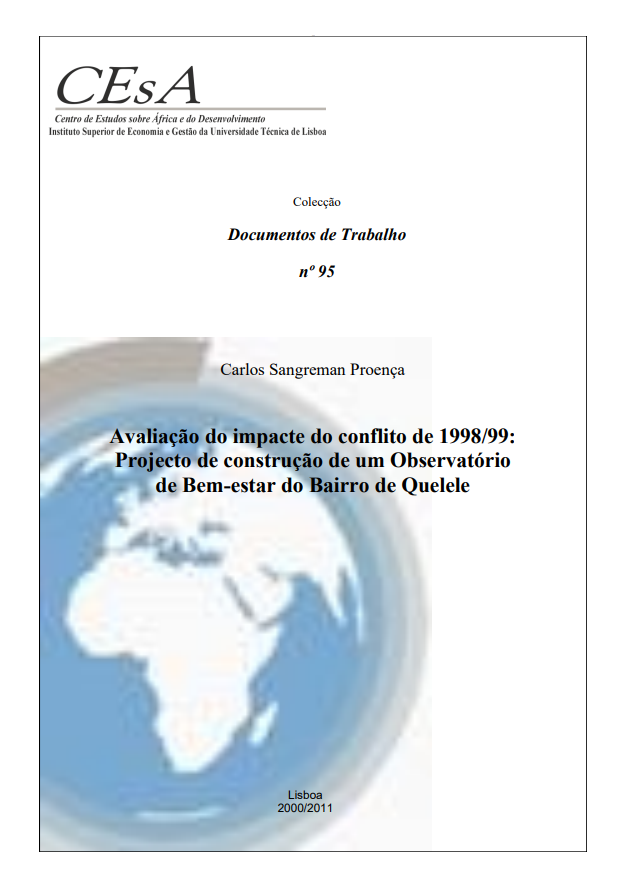
Working Paper 95/2000-2011: Avaliação do impacte do conflito de 1998/99: projeto de construção de um observatório de bem-estar do bairro de Quelele
Abstract:
For an analysis of the well-being of populations, we consider it essential to have a clear notion of the concept of State, and of the specific characteristics that it assumes in a country like Guinea-Bissau. Institutions with continuous functioning of qualified personnel and adequate funding, appear in States with a more mature process of organization, and therefore in a State under construction, the decisions on economic and social policy taken by the Government are carried out by institutions in an imperfect way and in accordance with with the degree of development of those who have responsibilities in each area. The result is a slow and difficult transition to the implementation of decisions by the Government or autarchies, creating disillusionment in the populations that expect an increase in the level of well-being provided by these institutions. BAYART (1989), when defining the State in most sub-Saharan African countries, considers a notion of authority that designates the set of institutions involving any position of power that allows the accumulation of capital, through the private appropriation of resources of different types, such as the military, diplomatic, cultural, technological and educational, in addition to the economic ones, whether within the current legislation, whether in predatory actions or charging commissions for decisions of institutional responsibility. Its separation from civil society is unclear, in the sense that individuals in positions of authority seek to appropriate resources for themselves and their social support group in the same way, whether or not they are in these institutional positions. In other words, we adopt, with this interpretation, Bayart’s concept of “overlay” for the State/Civil Society dichotomy, where this author defends the idea that such categories are not very clearly distinguished, nor are they of interest for the understanding of African societies. the consideration of an artificially defined distinction, which makes one forget the “depth of the historical field”. It seems to us that this overlap exists in Guinea-Bissau due to the weakness of the institutions mentioned above. It is the existence of this overlap that leads to greater importance in the strategies of populations pursued outside the state framework. In other words, the less the State, the more weight the actions of civil society have. The Welfare assessment and therefore the methodology for building an Observatory that allows us to monitor the evolution of Welfare in the neighborhoods has a theoretical framework that starts from the idea that it is fundamental to determine what would happen if there had not been concrete actions to improve the Welfare. Be. It is thus intended to operationalize the notion of multidimensional Welfare / Poverty, bringing together resources of individual consumption, such as food, of social use (or appropriation), such as those of ethnic or religious origin, and even resources of institutional origin, or participation in the political life of the community. It should be noted that the definition of the components of the EBP is very subjective, no matter how much recourse it makes to the existing literature. The surveys carried out in Europe that sought to determine these components gave very unreliable results either in the elements or in their hierarchy (Hagenaars, 1986). In Africa, participatory methods have not yet managed to generate a definition of generalizable BE standards, although the recent Voices of the Poor, financed by the World Bank, is a significant advance in this direction. What you want to detect is change, for better or worse, and not a static situation. For example, in the housing component, what is sought to be measured, in Avaliação do impacte do conflito de 1998/99 : projeto de construção de um observatório de bem-estar do bairro de Quelele, is whether housing conditions have improved or worsened.
Quotation:
Sangreman, Carlos. 2011. “Avaliação do impacte do conflito de 1998/99 : projeto de construção de um observatório de bem-estar do bairro de Quelele”. Instituto Superior de Economia e Gestão. CEsA – Documentos de Trabalho nº 95/2000-2011.
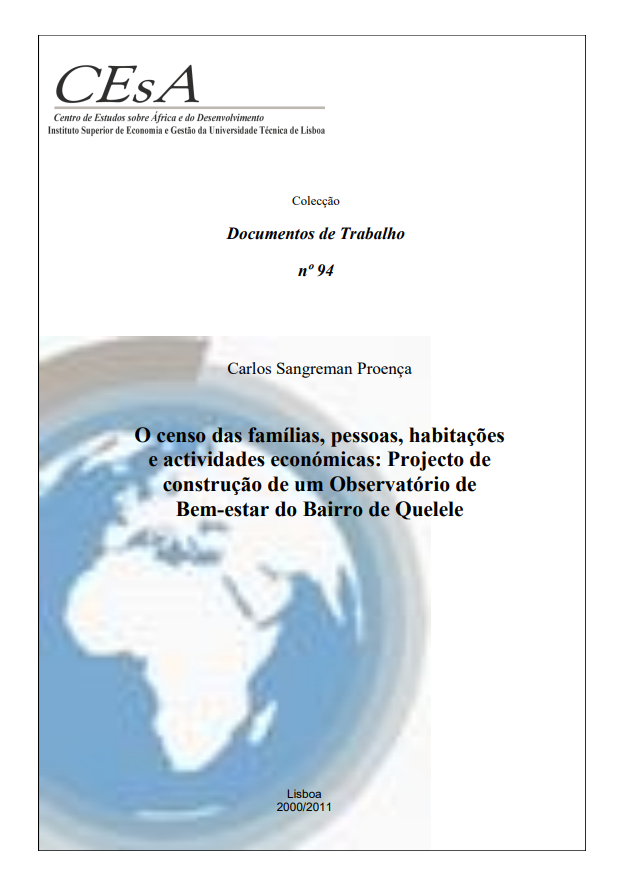
Working Paper 94/2011: O censo das famílias, pessoas, habitações e actividades económicas: projecto de construção de um Observatório de Bem-estar do Bairro de Quelele
Abstract:
O censo das famílias, pessoas, habitações e actividades económicas: projecto de construção de um Observatório de Bem-estar do Bairro de Quelele was carried out in pursuit of the objective of reinforcing the capacity of the living forces (today we would say “the agents”) of civil society in the Quelele neighborhood to intervene in order to achieve an increasingly better life, a level of higher welfare for the inhabitants. The theoretical basis is summarized in the book to be published in April by the OECD Development Assistance Committee (DAC), “DAC Guidelines on Poverty Reduction”, which starts from the multidimensional notion of well-being for a definition of poverty as deprivation of part of the or all of these dimensions. The author also assumes an active attitude towards the applied research outlined here. In other words, it does not consider itself as an external observer of a collective identity in formation, but rather as a small part of the express action of the various formal and informal institutions in the neighborhood so that this identity develops and asserts itself more and more clearly. This work would not have been possible without the work of the surveyors from the Quelele neighbourhood, who kept the bulletins they had already filled out throughout the period of the armed conflict, and used their knowledge of the terrain to carry out the survey in a very short period of time. Likewise, AD’s IT staff learned to work with the statistical information program with ease, a sign that the country’s human resources have evolved significantly. Thanks are all due to the people of AD, from its directors to the simplest members, as well as to Pedro Lonet Proença, who made available the photographs he took in the neighborhood, and to Cristina Duarte, who executed the panels for the exhibition to return the results enthusiastically and creatively.
Quotation:
Sangreman, Carlos. 2011. “O censo das famílias, pessoas, habitações e actividades económicas: projecto de construção de um Observatório de Bem-estar do Bairro de Quelele”. Instituto Superior de Economia e Gestão – CEsA Documentos de trabalho nº 94-2011.
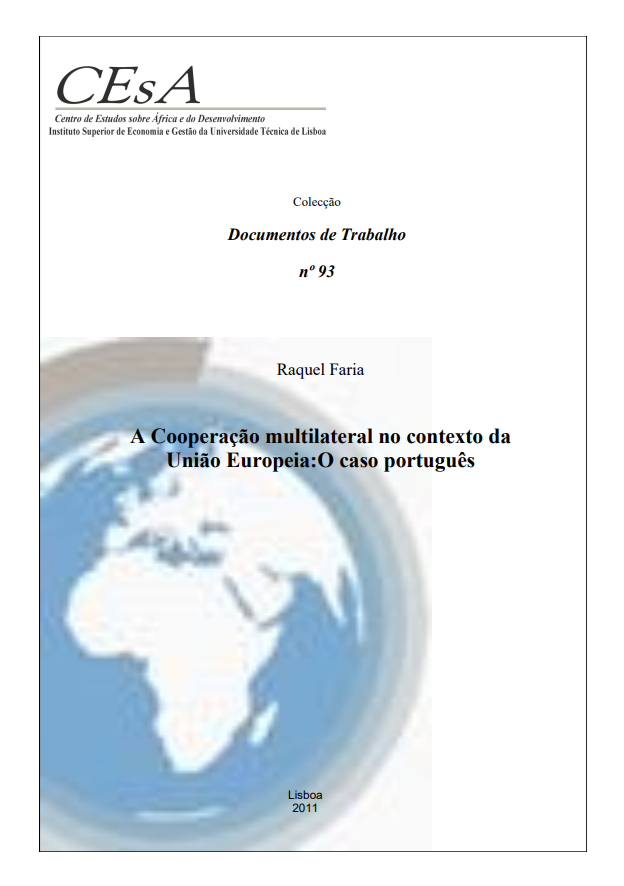
Working Paper 93/2011: A cooperação multilateral no contexto da União Europeia: o caso português
Abstract:
Over more than six decades, underdevelopment (situations of extreme poverty, the lack of basic sanitation networks, difficult access to drinking water and foodstuffs, …) has been one of the major concerns of the international community, more precisely of the European community. In fact, with the end of the Second World War, with the independence of many former colonies, the underdevelopment that characterized them became a target of great concern on the part of the most developed countries, not only from an economic point of view, but also from a political and social point of view. Although, at times, overlapped by other priorities and concerns, what is certain is that in this period there were already signs of fostering a joint will towards Development Cooperation. These signs grew, taking on particular importance in the mid-twentieth century, with the Treaty of Rome in 1957 and, later, with the conventions of Yaoundé I and II in 1963 and 1969, respectively. However, and as a result of the international political and economic context, it was in the 1970s (70s) that there was talk of a policy of Development Cooperation with the European Community. The objective was to develop a cooperation policy that could be applied to any and all countries, regardless of their characteristics. The idea of global cooperation, in the broadest sense of the word, then arises, which with some changes, largely as a result of evolution and even the phenomenon of globalization that has been witnessed in recent years, has perpetuated to the present day. It is within a framework of International Development Cooperation, based on the principles defended by the European Union’s development policy (good governance; promotion of human rights; promotion of fair, equitable and lasting development; respect for the rule of law and democratic policies; elimination of extreme poverty, …) that the Portuguese Cooperation policy is part of. Indeed, the national cooperation policy, regardless of the type of cooperation it assumes (bilateral, decentralized or multilateral), shares the same purposes as the European Union, in defining lines of action that ultimately aim at peace, the spirit of solidarity among peoples, the establishment and consolidation of a democratic political regime in all countries, irrespective of their culture, religion or ethnicity. It seeks, above all, respect for human rights in any circumstance, as well as the promotion of the Portuguese language and the protection of the environment, which is increasingly despised by Man. It is therefore concluded in A cooperação multilateral no contexto da União Europeia: o caso português that, despite the possibility of Portugal participating in the process of defining and deciding on strategies, the “(…) EU constitutes an institutional political framework to which we are bound and whose decisions and legislative process influence the performance of Portuguese cooperation in a special way, simultaneously constituting the space that allows us to disseminate and project within it the values and principles that animate Portuguese cooperation, as well as those of our development partners. It is also through the EU that these values can be taken to broader spaces than those that bilateral cooperation would allow us (…)” (Portuguese Strategy for Multilateral Cooperation, document of the Portuguese Institute for Development Support).
Quotation:
Faria, Raquel. 2011. “A cooperação multilateral no contexto da União Europeia: o caso português”. Instituto Superior de Economia e Gestão. CEsA – Documentos de Trabalho nº 93/2011.
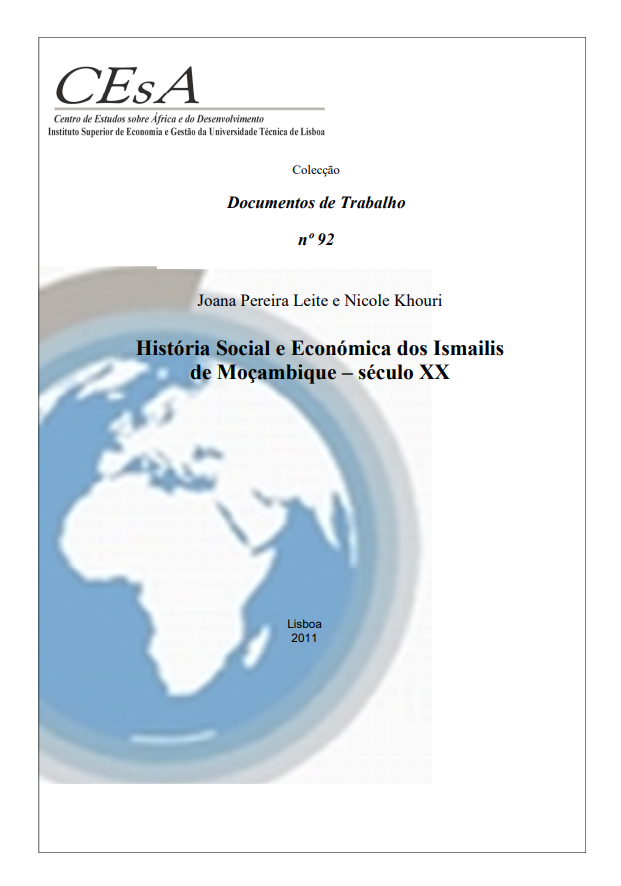
Working Paper 92/2011: História social e económica dos ismailis de Moçambique – Século XX
Abstract:
Recent historiography on the Indian presence in Mozambique and in the territories of Eastern and Central East Africa is unanimous in highlighting its commercial vocation in the context of the colonial occupation of the 19th and 20th centuries. In the case of Mozambique, the documentary sources available from the time of Portuguese colonisation attest to its importance both in the rural world, ensuring the monetisation of African agricultural produce, essential for the maintenance of the colonial export economy, and in the dynamisation of an important segment of retail trade in an urban context, aimed at a broad and heterogeneous spectrum of consumers who structured the domestic market in colonial times. The analyses inspired by such sources favour a macro-historical focus on the action and spatial inscription of these economic agents and rarely take into account the heterogeneous nature of the Indian communities in the Mozambican context, from the religious and socio-economic point of view. This invisibility concerns their own economic practices, the processes leading to their integration into colonial society, and also conceals the nature of the relations existing within them or resulting from their interaction with African societies, European economic agents and the colonial administration. This highlights the need to construct a new history of colonisation based on the testimony of the members of the different Indian communities originating in Mozambique, allowing the reductionist vision of the holistic perceptions consecrated by the economic historiography of colonisation to be broadened and enriched, on the basis of the sole recourse to written sources. It was the intention to respond to this challenge that led us to make the História social e económica dos ismailis de Moçambique – Século XX and collect memory narratives from members of the Indian Ismaili community present in Mozambique during the colonial period of the Estado Novo (1930-74).
Quotation:
Leite, Joana Pereira e Nicole Khouri. 2011. “História social e económica dos ismailis de Moçambique – Século XX”. Instituto Superior de Economia e Gestão – CEsA Documentos de Trabalho nº 92-2011.
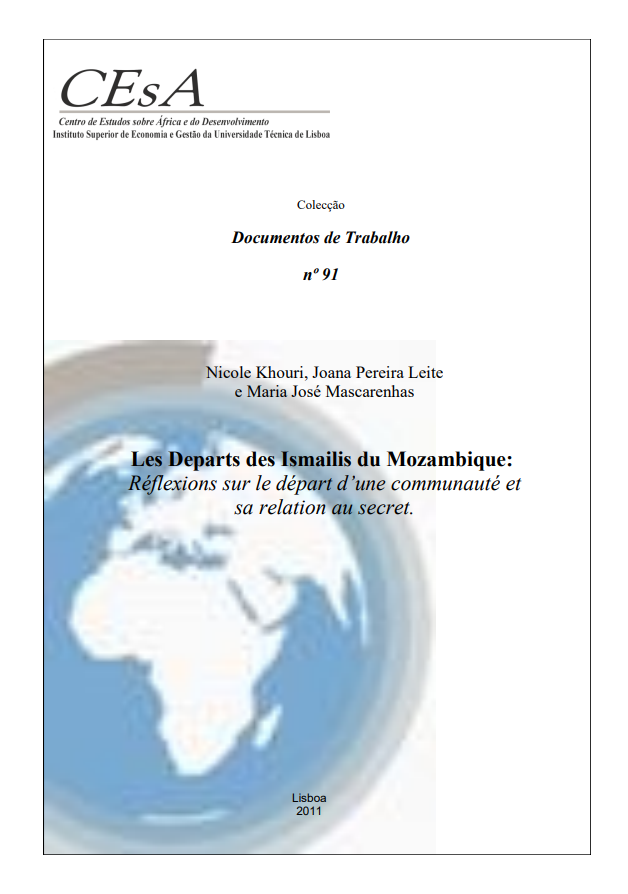
Working Paper 91/2011: Les départs des Ismailis du Mozambique: Réflexions sur le départ d’une communauté et sa relation au secret
Abstract:
When asked about their relations with the different groups that constituted colonial Mozambican society during the last decades of Portuguese colonisation, members of the Ismaili community spoke of their departure, which occurred between 1973 and 1976, as part of a ‘natural’ split that ended their settlement in the colony for two or three generations. Talking about a collective and organised departure proved to be a very delicate task, as if the attributes of this event referred to something forbidden or difficult to say to outsiders, in this case researchers. The question of the collective departure of an entire community initially opened the door to many interpretations linked to the immediate history of this event. It should be noted that, first of all, the mobilisation for a collective departure of the Ismaili community before April 1974 could have greatly upset the Portuguese colonial regime, which still did not believe that it would end in Mozambique. The organisation of this departure as a collective fact gave it the sign of the irreversibility of a time and the death knell of the colonial order. Did the Ismaili community betray the government of the colony by taking this step even before the fall of the colonial regime? Had not their leader, the Aga Khan III, assured the Salazar government of his community’s loyalty to the direction of Portuguese policy? Seen from the Mozambican side, would the collective departure have betrayed the African populations on whose land this community had flourished? Had it also betrayed the white Mozambicans who had stayed and thus made a different choice? That he had made a different choice? Needless to say, for Frelimo, leaving obviously meant betraying the ideals of the independence struggle. Les départs des Ismailis du Mozambique: Réflexions sur le départ d’une communauté et sa relation au secret aims to relate the collective and organised departure of the Ismaili community from Mozambique between January 1973 and December 1976, a central element of secrecy, to its various manifestations in the accounts of the departures of its own members.
Quotation:
Khouri, Nicole, Joana Pereira Leite e Maria José Mascarenhas. 2011. “Les départs des Ismailis du Mozambique: Réflexions sur le départ d’une communauté et sa relation au secret”. Instituto Superior de Economia e Gestão. CEsA – Documentos de Trabalho nº 91/2011.
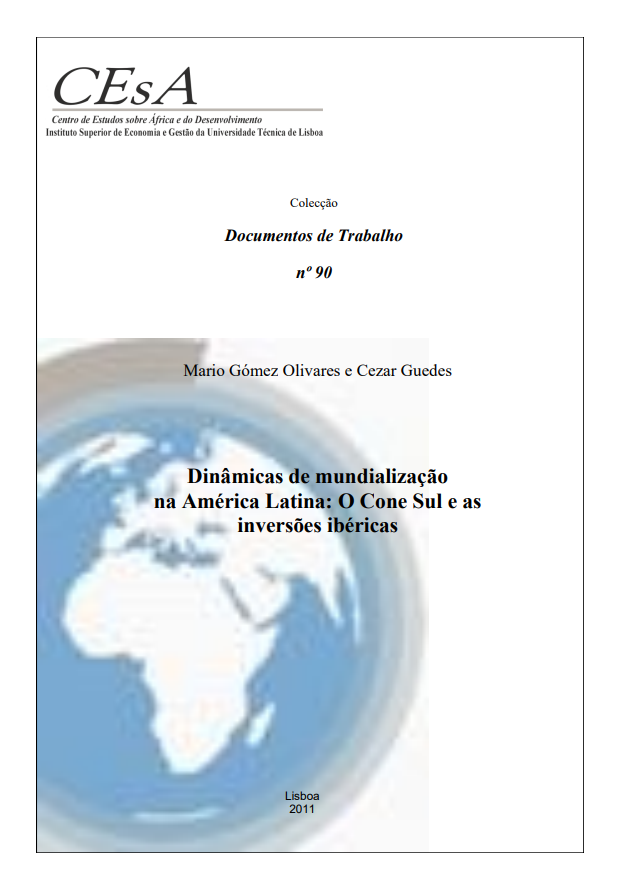
Working Paper 90/2011: Dinâmicas de mundialização na América Latina: o Cone Sul e as inversões ibéricas
Abstract:
Dinâmicas de mundialização na América Latina: o Cone Sul e as inversões ibéricas has the objective of analyzing in perspective the integration processes that Latin America has gone through, particularly the Southern Cone, in the long process of formation of the world economy since the expansion that incorporated the American continent to the capitalist development until the beginning of the XXI century. The emphasis is placed on the eighties of the last century, when another form of integration began, marked by commercial and financial openness, as well as by a growing integration of markets accompanied by the formation of economic blocs at global and regional level. The spatial logics and relations of the Southern Cone as a destination for foreign direct investment (FDI) originating in Spain and Portugal will be discussed in greater detail. This is an aspect that we highlight: from the point of view of the impact of investments, the Southern Cone is seen as an Iberian reality rather than a European or exclusively American one, as it was until the early 1990s. In other words, we underline the particularity of the Iberian option for a selective strategy of internationalization of its companies, leaving the traditional logic behind when moving towards a peripheral space outside the circuits of the Triad (USA, Japan and the European Union); on the contrary, and differently from the other European countries, enabling a path of integration which is what results from the internationalization of companies and the economy in the global space.
Quotation:
Gómez Olivares, Mario e Cezar Guedes. 2011. “Dinâmicas de mundialização na América Latina: o Cone Sul e as inversões ibéricas”. Instituto Superior de Economia e Gestão .CEsA – Documentos de Trabalho nº 90/2011
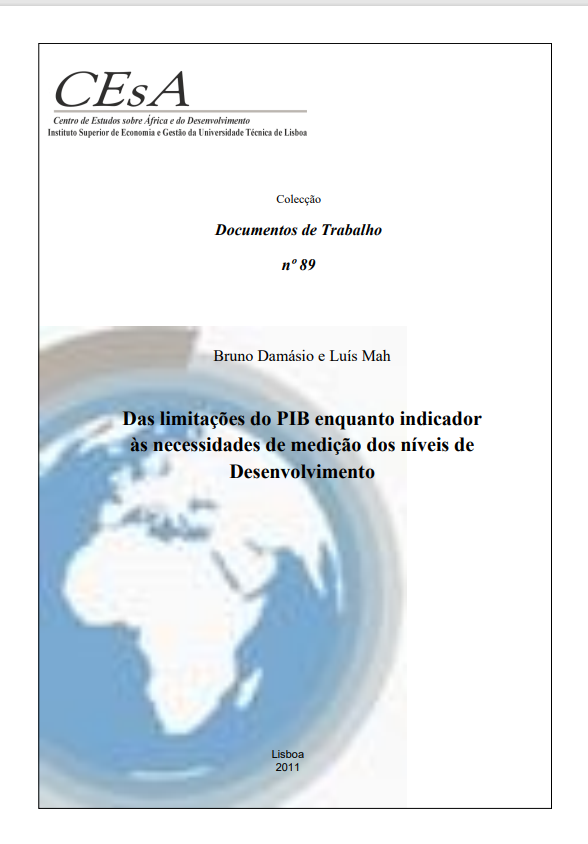
Working Paper 89/2011: Das limitações do PIB enquanto indicador às necessidades de medição dos níveis de desenvolvimento
Abstract:
Das limitações do PIB enquanto indicador às necessidades de medição dos níveis de desenvolvimento seeks to problematise some limitations and shortcomings of the traditional tools for measuring the economic performance and development of States, such as the Gross Domestic Product (GDP). The need to consolidate and stimulate the improvement of alternative indicators and measures is stressed, so as to reduce the existing deficiencies in the current measurements of development that serve as reference. Using the valid definition of economy as the allocation of scarce resources to unlimited needs, we arrive at a concept of economic policy as the action of public authorities in economic domains aimed at obtaining previously chosen results (Amaral, 1996). It is interesting, then, to reflect on the fact that, without the construction of statistical instruments and indicators that allow us to assess the consequences and interpret the results deriving from political action, it will be difficult to provide consistent guidance for economic policy-making. It is in this context that we start our essay with a meditation on the possible weakness of the economic activity indicator most used by mainstream economists and politicians.
Quotation:
Damásio, Bruno e Luís Mah. 2011. “Das limitações do PIB enquanto indicador às necessidades de medição dos níveis de desenvolvimento”. Instituto Superior de Economia e Gestão. CEsA – Documentos de Trabalho nº 89/2011.
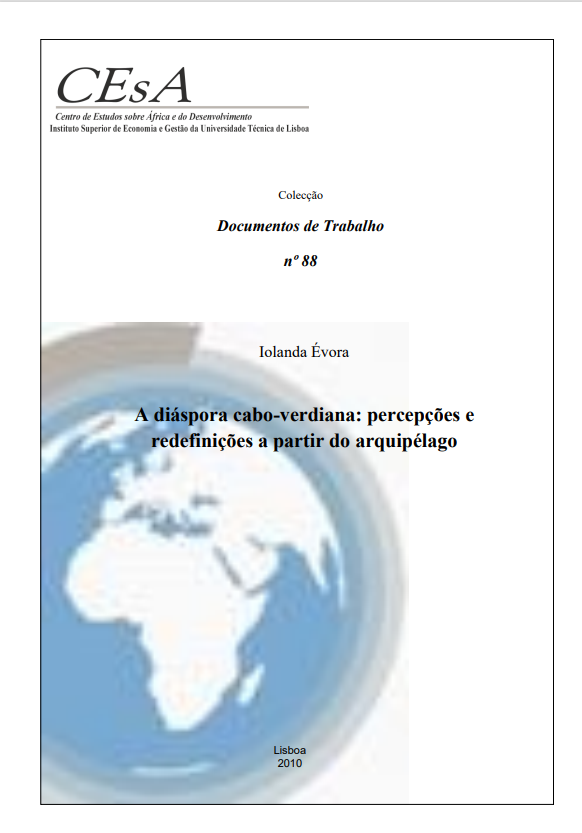
Working Paper 88/2010: A diáspora cabo-verdiana: percepções e redefinições a partir do arquipélago
Abstract:
Using the valid definition of economics as the allocation of scarce resources to unlimited needs, we arrive at a conception of economic policy as the action of public authorities in economic domains aimed at obtaining previously chosen results (Amaral, 1996). (Amaral, 1996). It is interesting, then, to reflect on the fact that, without the construction of statistical instruments and indicators that allow us to assess the consequences and interpret the results deriving from political action, it will be difficult to provide consistent guidance for economic policy-making. It is in this context that we begin our essay with a meditation on the possible weakness of the economic activity indicator most used by mainstream economists and politicians. A diáspora cabo-verdiana: percepções e redefinições a partir do arquipélago seeks to problematise some limitations and insufficiencies of the traditional tools for measuring the economic performance and development of states, such as the Gross Domestic Product (GDP). The need to consolidate and stimulate the improvement of alternative indicators and measures is highlighted, so as to reduce the existing deficiencies in the current measurements of development that serve as reference.
Quotation:
Évora, Iolanda. 2010. “A diáspora cabo-verdiana: percepções e redefinições a partir do arquipélago”. Instituto Superior de Economia e Gestão – CEsA – Documentos de trabalho nº 88/2010.
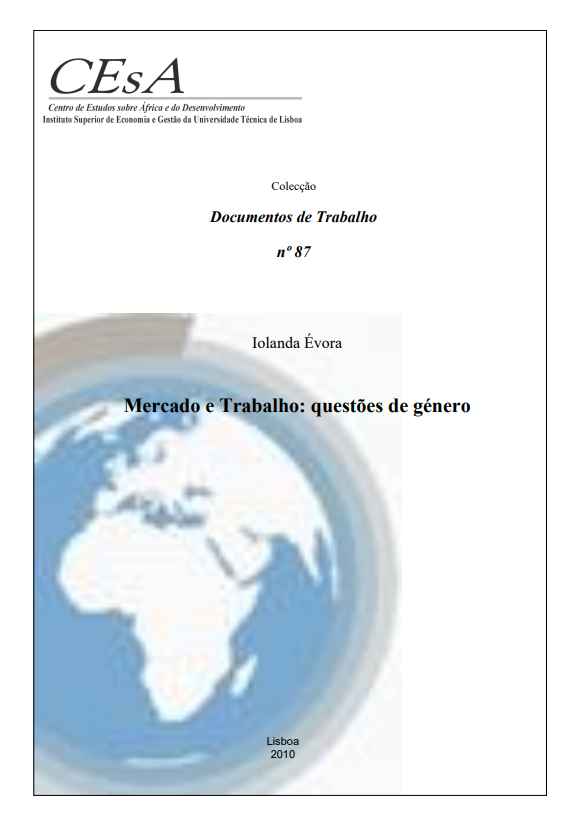
Working Paper 87/2010: Mercado e trabalho: questões de género
Abstract:
Mercado e trabalho: questões de género is based on reflections raised in observations made at fairs and markets in Cape Verde and Guinea-Bissau, within the scope of the Exploratory Visit project entitled “Free fairs and markets in the Portuguese-speaking space: work, sociability and income generation”. In this project, researchers from Brazil (Professor Leny Sato), Cape Verde and Guinea-Bissau, visited fairs and markets in the 3 countries and aimed to learn about important aspects of the daily dynamics of these organizational actions, of the processes that organize the work there. and some life trajectories of workers and agents who build micro-enterprises in these organizational contexts. The reflections that I bring here focus, above all, on situations observed in Cape Verde and Guinea-Bissau, because in these two countries the division of labor based on the gender category became much more visible, while the São Paulo fair shows much more work as a family occupation. The demand for development, autonomy and equality of opportunity in newly independent countries such as Cape Verde and Guinea-Bissau is introduced at the heart of the inter-human relationship and the dynamics of equality ended up being introduced in a domain that had been hidden for a long time: the relationships between men and women. In these countries, in the period of socialism and currently – which many call post-socialist -, with the new project of society, we seek to demonstrate the equivalence between the sexes in an unequivocal way in the public, intellectual and social domain, with more favorable laws. to the legal status of working women, and at the same time, investment is made in the professional field of women. The political changes in these two countries go beyond changes in relation to access to employment and encompass the construction of new meanings for work and family activities, as well as changes in the feminine sense of women’s place in society. In other words, in the new political contexts, we are witnessing the drawing of new boundaries between the spheres of work and the family, but it is important to point out that changes in the relationships between work and family have different consequences for men and women in real life.
Quotation:
Évora, Iolanda. 2010. “Mercado e trabalho: questões de género”. Instituto Superior de Economia e Gestão. CEsA – Documentos de Trabalho nº 87/2010.
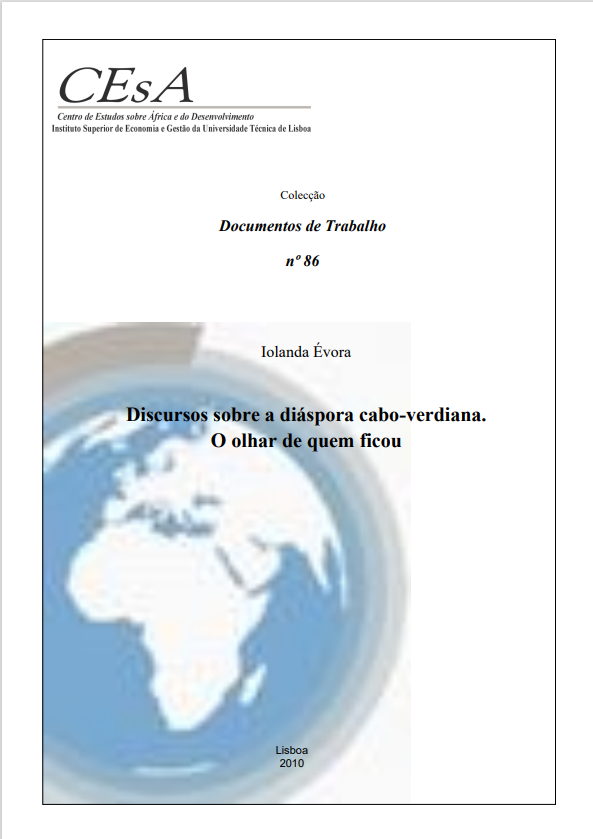
Working Paper 86/2010: Discursos sobre a diáspora cabo-verdiana: o olhar de quem ficou
Abstract:
The interest in the subject of Discursos sobre a diáspora cabo-verdiana: o olhar de quem ficou is included in our broader proposal of studies on Cape Verdean migration and, more specifically, within this field, with the intention of deepening knowledge about the position of different groups or social segments in relation to Cape Verdean migration. Verde, inside and outside the country. The idea is to underline that the field of Cape Verdean migration is very complex, which proves to be conducive to the reproduction of social and class divisions that are born in the archipelago, and therefore cannot be approached as if all Cape Verdeans were on it. and descendants had the same perspective and expectation. In this sense, the generalist conceptions about Cape Verdean migration must be understood as a result of disputes between groups to impose their conceptions on migration. In relation to Cape Verde, the emphasis has always been on the formation of a specifically diasporic identity by which, in an apparently paradoxical way, the cement would be constituted by spatial dispersion and the common reference to an almost mythical origin of a stepmother-land. In an imaginary way, they made the diasporic Cape Verdean identity positive, but in the name of the adverse conditions at the origin, that initial evil, they attributed exceptional gifts to this dispersed people arising from an ungrateful destiny.
Quotation:
Évora, Iolanda. 2010. “Discursos sobre a diáspora cabo-verdiana: o olhar de quem ficou”. Instituto Superior de Economia e Gestão. CEsA – Documentos de Trabalho nº 86/2010.





